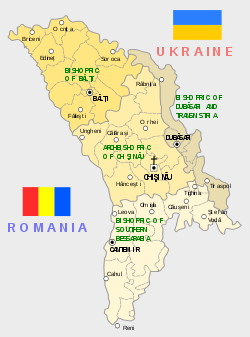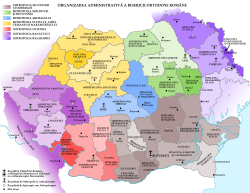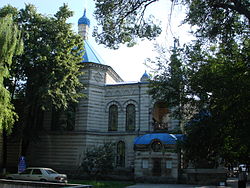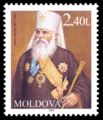- Metropolis of Bessarabia
-
Metropolis of Bessarabia 
Organization of the Metropolis of BessarabiaJurisdiction Romanian Patriarchate Diocese type Autonomous Metropolis Founded 1923 Current Bishop Petru Păduraru See Chișinău Headquarters Chișinău Territory  Moldova
MoldovaLanguage Romanian Population 720,000 Website Officialwebsite  Administrative map of the Romanian Orthodox Church, including the Metropolis of Bessarabia
Administrative map of the Romanian Orthodox Church, including the Metropolis of Bessarabia
The Metropolis of Bessarabia (Romanian: Mitropolia Basarabiei) is an autonomous Eastern Orthodox Metropolitan bishopric of the Romanian Orthodox Church. The Metropolis of Bessarabia was created in 1923 and organized in 1925, when the Archbishopric of Chișinău was raised to the rank of metropolis. Inactive during the Soviet occupation of Bessarabia (1940-1941) and the Soviet rule in Moldova (1944-1991), it was re-activated on September 14, 1992, on the territory of the Republic of Moldova. In 1995, the Metropolis of Bessarabia was raised to the rank of exarchate, with jurisdiction over the Romanian Orthodox communities of the ex-Soviet bloc and the Moldovan diaspora worldwide.[1]
The current Metropolitan of Bessarabia is Petru Păduraru. [2]
Contents
History
Metropolis of Bessarabia was founded after the annexation of Bessarabia by the Russian Empire in 1812, from the churches and monasteries of the Metropolis of Moldavia on that territory that no longer belonged to the Principality of Moldavia, by Gavril Bănulescu-Bodoni, a popular promoter of Moldavian/Romanian language and culture, who served also as its first Metropolitan. In 1918, Metropolitan Anastasius Gribanovsky was ousted after he refused to accede to the Romania's demand to secede from the Russian Orthodox Church and subordinate to the Romanian one. With the advent of Greater Romania in 1918, there were three church bodies: the autocephalous Romanian Orthodox Church (on the territory of Smaller Romania—prior to 1918—formed in 1872 from the union of the former Metropolis of Ungrovlahia and Metropolis of Moldavia), and the non-autocephalous Metropolis of Bessarabia and Metropolis of Transylvania. Therefore, in 1925, the rank of the Romanian Orthodox Church was raised to that of a Patriarchate, with the Metropolis of Bessarabia as one of its five sees. Gurie Grosu was the first Metropolitan of Bessarabia, and Efrem Enăchescu the second.
After the Soviet occupation of Bessarabia in 1940, the church, which then was a non-autonomous Metropolis, was banned, and its property has either changed uses, or was transferred to the Russian Orthodox Church, which established the Bishopric in Chişinău and Moldova. In 1980s, two more bishoprics were added, and the See raised to the status of a Metropolis. After Moldova's independence in 1991, part of the clergy followed Petru Păduraru, the Bishop of Bălţi, and re-established the Metropolis of Bessarabia. The Russian Orthodox Church refused to recognize the authority of the Bessarabian church, and two metropolia started an un-easy co-existence. During the 1990s, the one subordinated to the Russian Orthodox Church, called Moldovan Orthodox Church, gained the protection of the country's authorities and established itself as the official church, while the Orthodox Church of Bessarabia was refused registration according to the country's new law of religions.
In 2004, after years of legal hurdles and a final decision by the European Court of Human Rights, the Orthodox Church of Bessarabia received official registration, the Supreme Court of Justice of the Republic of Moldova recognizing it as "the spiritual, canonical, historical successor of the Metropolitan See of Bessarabia which functioned till 1944, including".[3] About 20% of country's Orthodox churches were or changed to be under its jurisdictions; a strong desire to similar moves has been expressed in many other parishes.[citation needed] This is a major area of tension with the Moldovan Orthodox Church. The position of the Romanian Orthodox Church in the dispute with the Russian Orthodox Church over the territorial jurisdiction is, according to a press release, that the two Metropolitan Sees should "peacefully co-exist and brotherly cooperate (…) harmonising, with wisdom and realism, the territorial principle with the ethnic principle, as agreed in the pastoral service of the Orthodox in Diaspora."[3]
The church is currently recognized only by some other Orthodox Churches, since the Patriarchate of Moscow opposes its recognition by all of them.[4] The current metropolitan in this church is Petru Păduraru (born 24 October 1946 in Ţiganca, elected as metropolitan in 1992), and it has about 720,000 members.[5]
See also
- History of the Orthodox Church in Moldova
- Romanian Orthodox Church
- List of members of the Holy Synod of the Romanian Orthodox Church
- Moldovan Orthodox Church
- St. Teodora de la Sihla Church
- Luminătorul
- Misionarul
Gallery
References
- ^ http://www.lumeam.ro/nr2_2005/si_totusi_moldova.html
- ^ Pagina inexistenta | Biserica Ortodoxă Română
- ^ a b Press release: A legitimate act for defending the Romanian identity - Explanations concerning the juridical recognition of the Metropolitan See of Bessarabia and of the suffragan eparchies, Romanian Patriarchy, 21 February 2008. (English) — [1] (French) — [2] (Romanian) — [3] (Russian)
- ^ Lucia Turcescu, Lavinia Stan, Church–state conflict in Moldova: the Bessarabian Metropolitanate (abstract)
- ^ (Romanian) "Biserica Ortodoxă Română, atacată de bisericile 'surori'" ("The Romanian Orthodox Church, Attacked by Its 'Sister' Churches", Ziua, 31 January 2008
External links
- Official website (Romanian)
- Statement concerning the arguments of the representatives of the Romanian Orthodox Church justifying the decision to establish dioceses of the Metropolia of Bessarabia
- Territorial Jurisdiction According to Orthodox Canon Law. The Phenomenon of Ethnophyletism in Recent Years, a paper read at the International Congress of Canon Law, 2001, (Ecumenical Patriarchate website)
- Torna a Patriarcato di Mosca (Italian)
Metropolis of Muntenia and Dobrudja Bucharest* · Târgovişte · Tomis · Alexandria and Teleorman · Argeş and Muscel · Buzău · Giurgiu · Lower Danube · Slobozia and Călăraşi · TulceaMetropolis of Moldavia and Bukovina Iaşi* · Suceava and Rădăuţi · Huşi · RomanMetropolis of Transylvania Sibiu* · Harghita and CovasnaMetropolis of Oltenia Craiova* · Râmnic · Severin · SlatinaMetropolis of Banat Timişoara* · Arad, Ienopole and Hălmagiu · Dacia Felix · Caransebeş · GyulaVad, Feleac and Cluj* · Alba Iulia · Maramureş and Sătmar · Oradea · Sălaj Metropolis of Bessarabia Chişinău* · Bălţi · Dubăsari and Transnistria · Southern BessarabiaMetropolis of Germany and Central Europe Germany* · Northern EuropeMetropolis of Western and Southern Europe Western Europe* · Italy · Spain and PortugalAustralia and New ZealandArchdioceses in bold; metropolis seats marked *Autocephalous and Autonomous Churches of Eastern Orthodoxy Autocephalous Churches Four Ancient Patriarchates: Constantinople · Alexandria · Antioch · Jerusalem
Russia · Serbia · Romania · Bulgaria · Georgia · Cyprus · Greece · Poland · Albania · Czech Republic and Slovakia · America* · Macedonia*Autonomous Churches * Autocephaly or autonomy is not universally recognized.
** Semi-autonomous part of the Russian Orthodox Church whose autonomy is not universally recognized.Categories:- Christianity in Moldova
- Eastern Orthodoxy by country
- Religious organizations established in 1925
- Metropolis of Bessarabia
Wikimedia Foundation. 2010.


